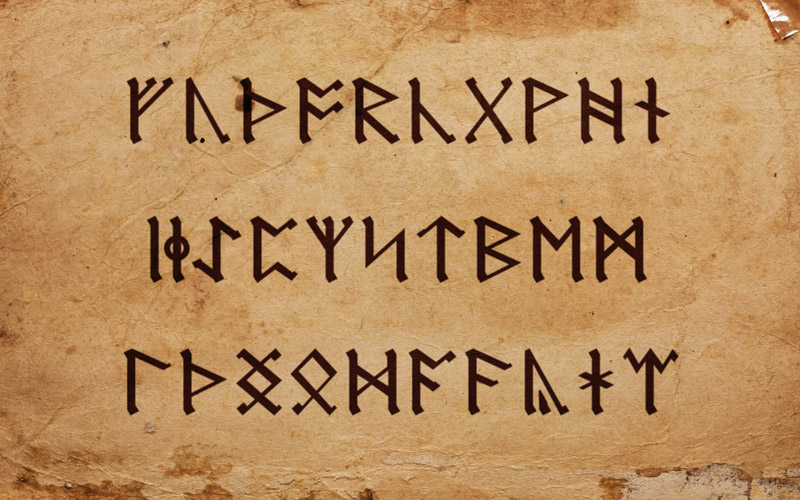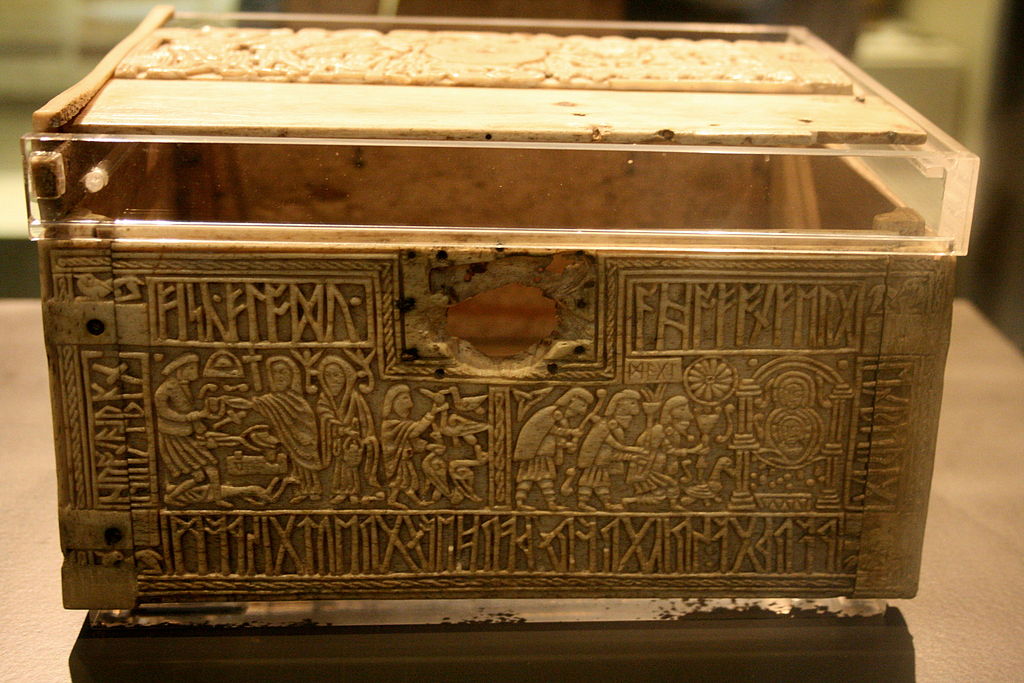Old English Writing: A History of the Old English Alphabet
Can you read Old English writing? Here's a sample:
Nu scylun hergan hefaenricaes uard
metudæs maecti end his modgidanc
uerc uuldurfadur sue he uundra gihuaes
eci dryctin or astelidæ
Those are the first few lines of Cædmon's Hymn, a 7th-Century poem generally considered to be the oldest surviving work of English literature. Any idea what it means?
Me neither. Let's look at the modern translation:
Now shall we praise the Warden of Heaven-Kingdom
the might of the Measurer and his purpose
work of the Wulder-Father as he of wonders
Eternal Lord the beginning created
Separated by more than a millennium, these two texts are barely recognisable as the “same” language. Only two words appear unchanged: he and his. A few other connections shine faintly through, like hefaen for heaven, fadur for father, and uerc for work, but I can’t glean much else… and even in the modern version, I still have no idea what a “Wulder-father” is.
There's no doubt about it: Old and Modern English might as well be two completely different languages. Cædmon's Hymn is utterly incomprehensible to the modern English reader.
(See here for an audio version of the original hymn.)
“Old English” is a broad topic. For this article I'll focus on the history of Old English writing. How was Old English written? How did it change as we shifted into middle and more modern dialects? Why doesn't “count” rhyme with the first syllable of “country”? And why do we continue to torture ESL students with bizarrities like the sentence “a rough coughing thoughtful ploughman from Scarborough bought tough dough in Slough”?
Below, I'll explore all these questions, and also tell you why you're probably pronouncing the word “ye” wrong.
But first, a short history lesson about Old English:
A Brief History of “Englisc”
English is a Germanic language, meaning its closest living relatives are Dutch, Frisian, and of course German. The Germanic family, however, is just one branch of the wider Indo-European language family. Other Indo-European branches include Slavic, Italic, and Celtic.
English originated in the area now called England (duh), but it wasn’t the first language to get here. Before English came along, most people in the British Isles spoke Celtic languages, a family whose modern descendants include Irish and Welsh.
Throughout the first millennium AD, the Celtic-speakers of Britain were slowly displaced by waves of immigration and invasion from the European mainland. Groups like the Angles, Saxons, Jutes, Danes and Frisians sailed to and settled in Britain, bringing their Germanic languages with them.
For obvious geographical reasons, these invaders mainly came from the southeast. That's why the few Celtic languages that remain in the British Isles today (Cornish, Welsh, Irish and Scottish Gaelic) are only found in the archipelago’s northern and western extremities. Meanwhile, the various Germanic dialects slowly merged into a new language that its speakers called Englisc.
It was roundabout this time that Cædmon (his name is pronounced roughly like “CAD-mon”) composed his hymn.
Old English Runes – found in Ruins
“Hold on a minute”, I hear someone say. “Apart from the weird “æ”, that hymn is written using modern English letters. I thought the Old English alphabet used cool runic characters, kind of like what the dwarves use in Lord of the Rings?”
You're right. (Where do you think Tolkien got the idea from?)
You’re reading this article in the Latin alphabet, but English wasn't always written like this. Before the current writing system was introduced to Britain by Christian missionaries in the 9th and 10th centuries, English was primarily written with Anglo-Saxon runes.
The Old English Alphabet
The Old English alphabet looked like this:

This alphabet is also sometimes called the futhorc, from the pronunciation of its first six letters.
Some experts think that the futhorc was brought to the British Isles by immigrants from Frisia (the northern Netherlands). Another theory is that they came here from Scandinavia, then were taken to Frisia in the other direction.
What we know for sure is that the first runic inscriptions started showing up in Britain around the 5th century A.D.. The oldest known piece of written English is the Undley Bracteate, a gold medallion with a runic inscription that reads “this she-wolf is a reward to my kinsman.” Another example is the Franks Casket, a whalebone chest from the north of England that’s been dated to the 8th century:

By the 11th century, the futhorc resembled one of the Tolkien novels that it inspired: lots of dead characters. But while most runes fell into disuse, a few survived and were mixed in with the newer writing system.
A “Thorny Problem” with Old English Runes
The following is an extract from the poem The Battle of Maldon, thought to be written shortly after the titular battle of 991 AD:
Brimmanna boda, abeod eft ongean,
sege þinum leodum miccle laþre spell,
þæt her stynt unforcuð eorl mid his werode,
þe wile gealgean eþel þysne
What are those funny “þ” and “ð” characters?
The former, called thorn, is a rune that stayed in use even after most other runes had been forgotten. The latter, called eth, is a modification of the Latin letter d. Both are pronounced like the modern “th” sound(s). So þæt means “that”, þe means “the”, and I have no idea what unforcuð means, but I imagine it was pronounced something like “un-for-kuth”.
(You can read a modern translation of The Battle of Maldon here.)
The rune ƿ (“wynn”) also survived longer than most, used to represent the sound that we now write as “w”. Eventually ƿ was replaced with “uu”, which was then simplified to “w”, which explains why “w” is called “double-u”.
If you speak a modern Latin language like Spanish, you’ll know that they generally don’t use “w”, except in foreign words and names like Washington. This is because “w” didn’t exist in the Latin alphabet; it’s a more recent innovation from English and other northern European languages.
Still, The Battle of Maldon is not much easier to understand than Caedmon’s Hymn.
Thanks to Runes, You're Saying “Ye” Wrong
Runes that have filtered down into “Latin” English can mean that even today we pronounce some English words incorrectly.
There's a trope in the English-speaking world of writing “ye olde [something]” when you want the name of that something to sound old-timey or Medieval. For example, you might see a pub called “Ye Olde Pubbe”.
There are two problems with this. First of all, the world olde is (ironically) a modern invention. “Old” was never written like that in historical English.
Secondly, when modern speakers read the “ye” of “ye olde”, they usually pronounce it like it's written, with a “y” sound. This isn’t how Old English speakers would have said it! If you said “ye” like this to an 11th-Century Englishman, they’d understand it as a plural form of you; this sense lives on in archaic expressions like “hear ye”.
The misconception stems from the fact that the word “the” was once written as “þe”, using the “thorn” rune. A handwritten “þ” sometimes looked like a “y”. More importantly, Medieval printing presses didn’t have a “þ” character, so they substituted in “y” instead. So when they printed ye, they were actually writing the.
So, the correct way to pronounce “ye olde pubbe” is in fact simply “the old pub”.
How Old English was Changed Forever by Norman Nobles
Have you noticed how many words English has?
Why do comprehend, respire and azure need to exist when we already have understand, breathe, and blue?
To answer this question, we must go all the way back to the year 1066. As every Brit learns in school, that was the year when William of Normandy, claiming to be the rightful king of England (it was a family matter) sailed across the English Channel, killed his rival Harold in battle, and installed himself on the throne.
With the Normans in charge of England, their dialect of French became the language of nobility. To this day, the British parliament still uses Norman French for certain official purposes.
Meanwhile, the plebeians and riff-raff continued to speak Englisc. The two languages merged over time, but we’re still living with the consequences: fancy words like comprehend and respire have their roots in Latin (via Norman French), while their more common synonyms like understand and breathe are the “original” English words, Germanic in origin.
(Fun fact: despite the French on their tongues, the Normans were actually Vikings who had settled in France; the name “Norman” comes from “North-man”. For some reason they lost their original language and picked up one of the local dialects instead, but the more interesting point is that the modern British royal family are directly descended from the same Norman nobles who conquered England in 1066. You heard it right: Queen Elizabeth II is a Viking.)
As well as introducing new vocabulary, the Normans also changed the spelling of some words. For example, the Old English hwaer, hwil and hwaenne became where, when and while, even though the “hw-” spelling more accurately reflected the pronunciation.
Some English speakers, particularly in parts of the U.S., still pronounce words like where with an “h” sound at the beginning – listen to how Johnny Cash says the word “white” at about 0:14 in The Man Comes Around. It’s been nearly 1,000 years, and we still haven’t recovered from this weird spelling change.
And as anyone remotely literate in English knows, when it comes to weird spelling, “white” is just the tip of the iceberg.
From Old English to Middle English
Linguists generally mark the Norman Conquest as the dividing line between Old and Middle English. Within a few centuries, English was finally starting to resemble the language we speak today:
A monk ther was, a fair for the maistrye
An out-rydere, that lovede venerye;
A manly man, to been an abbot able.
Ful many a deyntee hors hadde he in stable
That’s from from The Canterbury Tales by Geoffrey Chaucer, probably the most famous work of pre-Shakespearean English literature, and a well-known example of (Late) Middle English.
And it’s readable! The spelling is weird, and I don't know what venerye or “maistrye” are, but for the most part I can understand Chaucer without having to search Google for a modern translation.
The Canterbury Tales were written at the tail-end of the 14th Century, a time when English spelling varied widely from place to place. Why wouldn’t it? When you rarely communicate with people who live far away, and you pronounce things differently from them anyway, there’s not much incentive for everybody to try and spell things the same way. All that started to change, however, in the late 15th Century, thanks to an important new invention: the printing press.
As it became easier to put English to paper and to disseminate it widely, local variations in spelling were slowly ironed out. But who got to decide which spelling was “correct”? The answer: no-one. Publishers in different parts of the country used spellings that reflected their local pronunciations and biases. Some spellings caught on nationally, others didn’t, and the emerging “standard” system of English spelling picked up words from all over the place and became full of inconsistencies.
These inconsistencies persist to this day, and have only got worse as pronunciation has changed further. You can see this, for example, in the works of Shakespeare. Shakespeare rhymed “sword” with “word”, to give just one example – it made sense at the time, but since then the pronunciations have split. Even then, we haven’t bothered to update the spelling, so “sword” and “word” still look like they should rhyme.
(Some troupes now put on productions of Shakespeare using the original Elizabethan pronunciation, a delight for language nerds like myself.)
There was also a fad in some parts for using spellings that reflected not a word’s pronunciation but its etymology. So for example, “debt” gained its silent “b”, reflecting its origins in the Latin debitum.
Similarly, the Middle English word “iland” gained a silent “s” in order to make it closer to the French isle (and the Latin insula). This was actually a mistake: iland was a Germanic word, and its resemblance to French and Latin is just a coincidence. 500 years later, the misconception remains uncorrected.
Even more unfortunately for modern learners of English, the advent of the printing press happened at a time when English pronunciation was changing rapidly. Modern linguists call it the Great Vowel Shift. Over a period of a few hundred years, the pronunciations of most English vowels changed dramatically, at the exact same time that their spellings were becoming set in stone.
And so in the 21st century, English spelling makes so little sense that even native speakers can struggle.
- Why don’t “stove”, “love” and “move” rhyme with each other?
- Why is “trollies” the plural of “trolley”, but the plural of “monkey” isn’t “monkies”?
- Why is it “i before e, except after c”… and except in science, receive, species, sufficient, vein, feisty, foreign, or ceiling?
Hell, we don’t even write our language's name in a way that makes sense. Shouldn’t it be “Inglish”?
I wonder what the total economic cost is of all this madness? How much time and energy are wasted on schooling children, reprinting documents with errors, and pedantically correcting people who write “sneak peak” or “wrecking havoc”?
It shouldn't have to be like this. Is there any way out of this mess? We’ll see.
English Writing: A Standard Way of Spelling?
There have been many attempts to reform English spelling, and some have even been successful: when Noah Webster published his dictionaries in the 19th Century, he made several proposals for new spellings. Some, like the idea to drop the “k” from “publick” and “musick”, caught on. Others, like the suggestion to remove the “u” from “colour” and “humour”, only gained traction on one side of the Atlantic. Many of his other proposals didn’t catch on at all, and English remains full of oddities.
Reform isn’t impossible. The German-speaking countries managed to do it in the 1990s, slightly simplifying the spelling of some German words and making the new orthography compulsory in government documents and schools. More recently, the CPLP (Community of Portuguese Language Countries) passed a similar reform, which is still being implemented in Portuguese-speaking countries today.
In the English-speaking world, however, it’s unlikely that we’ll muster the will to change our spelling any time soon. One problem is that we don’t have an official body like the CPLP that has any influence over the language. Another problem is that there are there are just too many English speakers, spread across too many countries, with too many variations in pronunciation. No-one would ever agree on what the “correct” new spellings should be.
But the biggest barrier of all is that most people don’t care. In fact, many native English speakers are proud of the difficulty of English spelling; it’s seen as an intellectual achievement to master it all. And of course, people who have already learned all the current spellings don’t want to go through the bother of learning them all again.
For now, English spelling is one of those things like the QWERTY keyboard, or the fact that different countries drive on different sides of the road. It’s not ideal, and if we could start over we’d probably do things differently, but it’s just not worth the effort to fix. There are more important problems to worry about.
So it seems that for now, we’re stuck with that “rough coughing thoughtful ploughman”. And it’s been a hell of a journey to get here.



Social